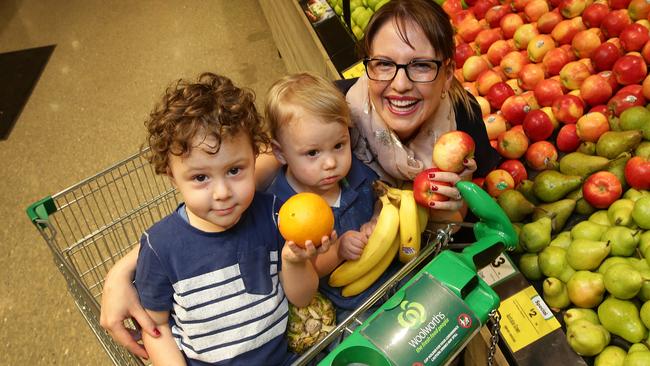Supermarkets should dump lollies from checkouts, promote healthier options: experts
EXPERTS are urging grocery chains to be more responsible for preventing obesity by banishing lollies and soft drinks from checkouts, limiting discounts on junk food and promoting more wholesome food in catalogues.
VIC News
Don't miss out on the headlines from VIC News. Followed categories will be added to My News.
SUPERMARKETS should banish lollies and soft drinks from checkouts, limit discounts on junk food, and promote more wholesome food in catalogues, obesity experts say.
Deakin University researchers are urging grocery chains to take more responsibility for preventing obesity.
FATTER BODIES MAKE YOUNGER KNEES WEAK
HOW BMI IS HIDING OUR OBESITY PROBLEM
If they do not improve, governments should step in to force change, researchers say.
“Unhealthy diets are creating a public health crisis,” Associate Professor Gary Sacks said.
“While supermarkets have taken some positive steps, there is a much greater role for them to play as part of a whole-society response.
“We are all responsible for what we eat, but people are heavily influenced by the type of food available, the price, and how they are promoted.”

A first-of-its kind study rating obesity prevention and nutrition policies and promises from the nation’s biggest supermarkets calls for “universal healthy checkouts” to reduce temptations for shoppers, replacing confectionery and sugary drinks near registers with snacks such as fresh and dried fruit, nuts, and bottled water.
The Inside Our Supermarkets report, compiled by Deakin’s Global Obesity Centre, also recommends having more wholesome items at the end of aisles, and cutting sugar, salt and “bad” fat in “own brands”.
“Governments need to closely monitor the healthiness of supermarket environments, and consider stronger policy intervention where voluntary company actions are insufficient,” the report states.
Two in three adults and one in four children in Australia are overweight or obese.
Supermarkets said they were encouraging better choices in many ways, including by increasing the availability of wholesome food and by reformulating some products.
The report commends initiatives such as Coles’ and Woolworths’ rollouts of own-brand health star-rating labels, Woolies’ free fruit for kids program, and some action on improved product nutrition.

Mum Nicole French supported placing more wholesome items at checkouts.
“Parents can’t sit back and blame the world, as it is our role to guide children in choices, but it would be good to have an environment that makes that process easier,” Ms French said.
The report’s assessment scored Woolworths at 46 out of 100; Coles at 40; Aldi at 11; and IGA at 8.
Coles, which has athletics partnerships and a sports for schools program, noted the report “does not take account of the important role of exercise in a healthy lifestyle”.
THE BIG FAT LIE WE’RE TELLING OURSELVES
Woolworths supermarkets managing director Claire Peters said while progress had been made “there is more we can do”, such as the expansion of the fresh fruit and vegetable sections in its new and refurbished stores.
Aldi disputed the findings, saying the report did not fully or accurately reflect its policies and practices
Metcash said nutrition labelling on its “private label” foods in IGA stores was “more beneficial” than rivals’ health star-ratings, but that this had been downplayed.
The study also overlooked initiatives such as a family program that included healthy, affordable recipes.
HOW SUPERMARKETS CAN FIGHT OBESITY
• SET targets to reduce sugar, salt, “bad” fat and portion size/energy content across “own brands”.
• RESTRICT children’s and teenagers’ exposure to marketing of unwholesome foods.
• REMOVE lollies and soft drinks from displays near all registers.
• INCREASE the proportion of wholesome products in end-of-aisle displays and catalogues.
• LIMIT discounts or “buy-one-get-one-free” specials for chocolates, chips and other unwholesome foods, and improve affordability of wholesome food.
• ADOPT widespread health star-rating labels across “own brands”.
• GIVE additional rewards in loyalty programs for wholesome purchases.


